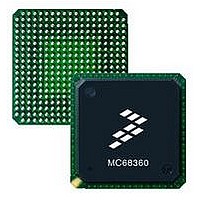MC68EN360CAI25L Freescale Semiconductor, MC68EN360CAI25L Datasheet - Page 705

MC68EN360CAI25L
Manufacturer Part Number
MC68EN360CAI25L
Description
IC MPU QUICC 25MHZ 240-FQFP
Manufacturer
Freescale Semiconductor
Series
MC68000r
Datasheets
1.MC68EN302AG20BT.pdf
(8 pages)
2.MC68EN360VR25L.pdf
(14 pages)
3.MC68EN360VR25L.pdf
(2 pages)
4.MC68EN360CAI25L.pdf
(962 pages)
Specifications of MC68EN360CAI25L
Processor Type
M683xx 32-Bit
Speed
25MHz
Voltage
5V
Mounting Type
Surface Mount
Package / Case
240-FQFP
Core Size
32 Bit
Cpu Speed
25MHz
Embedded Interface Type
SCP, TDM
Digital Ic Case Style
FQFP
No. Of Pins
240
Supply Voltage Range
4.75V To 5.25V
Rohs Compliant
Yes
Family Name
M68xxx
Device Core
ColdFire
Device Core Size
32b
Frequency (max)
25MHz
Instruction Set Architecture
RISC
Supply Voltage 1 (typ)
5V
Operating Supply Voltage (max)
5.25V
Operating Supply Voltage (min)
4.75V
Operating Temp Range
-40C to 85C
Operating Temperature Classification
Industrial
Mounting
Surface Mount
Pin Count
240
Package Type
FQFP
Lead Free Status / RoHS Status
Lead free / RoHS Compliant
Features
-
Lead Free Status / Rohs Status
Compliant
Available stocks
Company
Part Number
Manufacturer
Quantity
Price
Company:
Part Number:
MC68EN360CAI25L
Manufacturer:
APLHA
Quantity:
12 000
Company:
Part Number:
MC68EN360CAI25L
Manufacturer:
Freescale Semiconductor
Quantity:
10 000
Part Number:
MC68EN360CAI25L
Manufacturer:
FREESCALE
Quantity:
20 000
- MC68EN302AG20BT PDF datasheet
- MC68EN360VR25L PDF datasheet #2
- MC68EN360VR25L PDF datasheet #3
- MC68EN360CAI25L PDF datasheet #4
- Current page: 705 of 962
- Download datasheet (4Mb)
This register may be read by the user to determine which interrupt requests are currently in
progress (i.e., the interrupt handler started execution) for each CPM interrupt source. More
than one bit in the CISR may be a one if higher priority CPM interrupts are allowed to inter-
rupt lower priority level interrupts within the same CPM interrupt level. For example, the
TIMER2 interrupt routine could interrupt the handling of the TIMER3 routine, using a special
nesting technique described earlier. During this time, the user would see both the TIMER3
and the TIMER2 bits simultaneously set in the CISR.
7.15.6 Interrupt Handler Examples
The following examples illustrate proper interrupt handling of CPM interrupts. Nesting of
interrupts within the CPM interrupt level is not shown in the following examples.
7.15.6.1 EXAMPLE 1—PC6 INTERRUPT HANDLER. In this example, the CPIC hardware
clears the PC6 bit in the CIPR during the interrupt acknowledge cycle. This is an example
of a handler for an interrupt source without multiple events.
7.15.6.2 EXAMPLE 2—SCC1 INTERRUPT HANDLER. In this example, the CIPR bit
SCC1 remains set as long as one or more unmasked event bits remain in the SCCE1 reg-
ister. This is an example of a handler for an interrupt source with multiple events. Note that
the bit in CIPR does not need to be cleared by the handler, but the bit in CISR does need to
be cleared.
1. Vector to interrupt handler.
2. Handle event associated with a change in the state of the port C6 pin.
3. Clear the PC6 bit in the CISR.
4. Execute the RTE instruction.
1. Vector to interrupt handler.
2. Immediately read the SCC1 event register (SCCE1) into a temporary location.
The SCC CISR bit positions are NOT affected by the relative pri-
ority between SCCs (as determined by the SCxP and SPS bits
in the CICR).
If the error vector is taken, no bit in the CISR is set. All undefined
bits in the CISR return zeros when read.
The user can control the extent to which CPM interrupts may in-
terrupt other CPM interrupts by selectively clearing the CISR. A
new interrupt will be processed if it has a higher priority than the
higher priority interrupt having its CISR bit set. Thus, if an inter-
rupt routine lowers the 3-bit mask in the CPU32+ core to the
CPM level minus one and also clears its CISR bit at the begin-
ning of the interrupt routine, a lower priority interrupt can inter-
rupt the higher one, as long as the lower priority interrupt is of
higher priority than any other CISR bits that are currently set.
Freescale Semiconductor, Inc.
For More Information On This Product,
MC68360 USER’S MANUAL
Go to: www.freescale.com
NOTES
CPM Interrupt Controller (CPIC)
Related parts for MC68EN360CAI25L
Image
Part Number
Description
Manufacturer
Datasheet
Request
R
Part Number:
Description:
Manufacturer:
Freescale Semiconductor, Inc
Datasheet:
Part Number:
Description:
Manufacturer:
Freescale Semiconductor, Inc
Datasheet:
Part Number:
Description:
Manufacturer:
Freescale Semiconductor, Inc
Datasheet:
Part Number:
Description:
Manufacturer:
Freescale Semiconductor, Inc
Datasheet:
Part Number:
Description:
Manufacturer:
Freescale Semiconductor, Inc
Datasheet:
Part Number:
Description:
Manufacturer:
Freescale Semiconductor, Inc
Datasheet:
Part Number:
Description:
Manufacturer:
Freescale Semiconductor, Inc
Datasheet:
Part Number:
Description:
Manufacturer:
Freescale Semiconductor, Inc
Datasheet:
Part Number:
Description:
Manufacturer:
Freescale Semiconductor, Inc
Datasheet:
Part Number:
Description:
Manufacturer:
Freescale Semiconductor, Inc
Datasheet:
Part Number:
Description:
Manufacturer:
Freescale Semiconductor, Inc
Datasheet:
Part Number:
Description:
Manufacturer:
Freescale Semiconductor, Inc
Datasheet:
Part Number:
Description:
Manufacturer:
Freescale Semiconductor, Inc
Datasheet:
Part Number:
Description:
Manufacturer:
Freescale Semiconductor, Inc
Datasheet:
Part Number:
Description:
Manufacturer:
Freescale Semiconductor, Inc
Datasheet:











